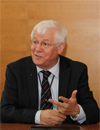 |
||
|
Russian Fast Neutron Nuclear Reactor Design Moves Forward RIA Novosti, PUBLISHED 17.04.2014 A committee of Russian scientists has signed off on the design of the groundbreaking MBIR fast neutron nuclear reactor, moving the project closer to full-scale construction, a research institute involved in the project said Wednesday. Russia, the United States and France signed a deal last June to jointly conduct research at the reactor in Dimitrovgrad in Russia’s Volga region, in hopes of studying new types of nuclear fuel, construction materials and coolants. The MBIR is planned to have a capacity of about 150 megawatts, making it the most powerful research reactor in the world. The project is expected to cost 16.4 billion rubles ($454 million). Topics: Fast breeders, Russia Other news: Hungary Enacts Law to Expand Nuclear Power With Russian Aid Hungary’s president has signed a bill into law to expand a nuclear power plant in the country with Russian assistance. Hungary Lawmakers OK Russia Nuclear Plant Deal Russia will provide Hungary a loan of up to 10 billion euros ($13.5 billion) - around 80 percent of construction costs. Russia to Lend Hungary $13.7Bln for Nuclear Plant The deal was announced during a state visit to Moscow by Hungarian Prime Minister Viktor Orban and was hailed by Russian President Vladimir Putin. |
Hero of the day 
We are currently working with the Nuclear Decommissioning Authority (NDA) on this approach, which was submitted in response to their February 2012 call for alternative proposals. We appreciate that the UK is in the early stages of their policy development activities and are pleased to be involved in such important work. INTERVIEW
Yanko Yanev OPINION
Joint Plan of Action |

